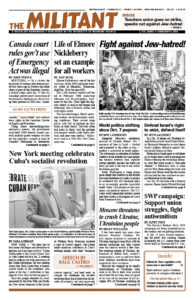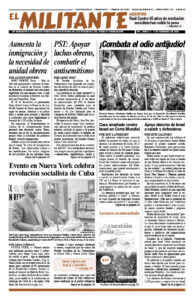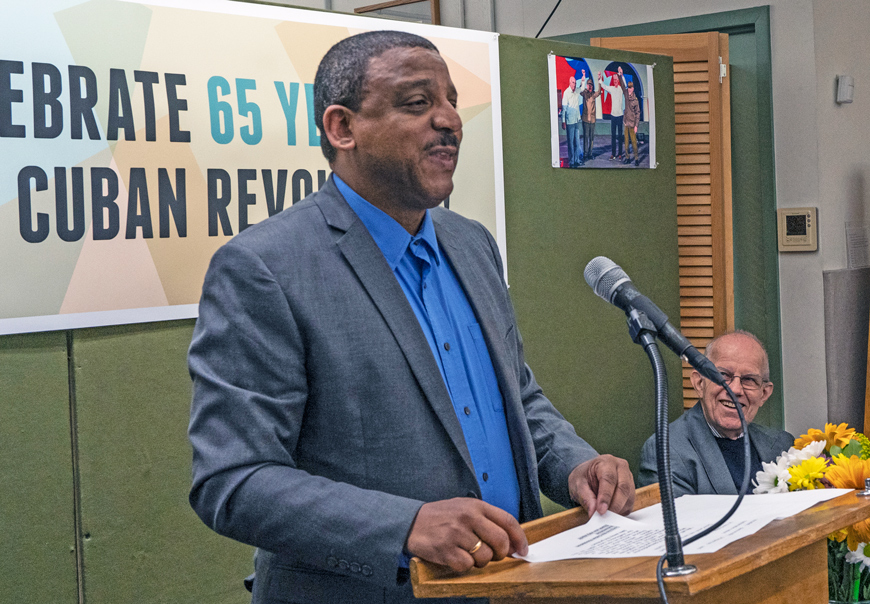NEW YORK — “We have had to face many challenges and adversities to get here, but it has been worth it,” Cuban Ambassador to the United Nations Yuri A. Gala López said at a Jan. 21 meeting here to celebrate the 65th anniversary of the Cuban Revolution. He was quoting Army Gen. Raúl Castro Ruz, a historic central leader of the revolution, who spoke at the Jan. 1 celebration in Santiago de Cuba. (See full text.)
Sixty-five people attended the event, sponsored by the New York and Northern New Jersey branches of the Socialist Workers Party. Everyone received a copy of Castro’s speech. The Cuban leader expresses confidence in Cuba’s working people, with their “immense creative capacity” and hard work, to conquer the challenges the socialist revolution faces due to more than six decades of economic war and aggression by U.S. imperialism.
Speaking along with Gala López was Steve Clark, a member of the Socialist Workers Party National Committee. Joanne Kuniansky, SWP candidate for U.S. Senate from New Jersey, chaired.
Yes, Clark said, the revolution has been “worth it — worth it for the Cuban people and for hundreds of millions of working people in the United States and the world over.” It is, along with the 1917 Bolshevik Revolution led by V.I. Lenin, “one of the two great socialist revolutions of the past century.”
The 1959 victory, Raúl Castro explained, was “the triumph of the only revolution that has ever existed in Cuba, initiated on Oct. 10, 1868.” A revolution that began in the fight for colonial independence and abolition of slavery, Clark said, and “culminated 90 years later in opening the road to the first socialist revolution in the Americas.”
From the earliest days, Clark said, the SWP has gotten out the truth about the revolution, using the Militant and more than 40 books published by Pathfinder Press, mostly speeches and interviews by its leaders. “We get the books you see on the shelves here into the hands of workers and youth.”
Clark recounted how Jack Barnes, now SWP national secretary, spent the summer of 1960 in Cuba. At the time he was a student at Carleton College. When Barnes returned, he reported what he’d seen and learned to SWP leaders in Minneapolis, already active champions of Cuba’s revolution. “These workers told Jack that the duty of those won to the example set by Cuba’s working people was to build a workers party capable of making a victorious socialist revolution in the U.S.,” Clark said. Barnes tells this story in Cuba and the Coming American Revolution, published by Pathfinder.
The Cuban Revolution “was not about ideologies, systems, about mechanisms or structures,” Clark said. “It was about involving the working men and women who made the revolution and have built and defended it right up to today. It’s about their transformation as human beings as they do so.”
Several years after the 1959 victory, Fidel Castro spoke about the Freedom Caravan, the eight-day journey the victorious Rebel Army made across Cuba from Santiago to Havana, stopping to talk to workers and peasants who poured out to greet them. “As we moved through the towns and cities, I saw hundreds and thousands of men and women with the red-and-black uniforms of the July 26 Movement,” Fidel said. “But many more thousands wore uniforms that weren’t black and red but were the work shirts of workers and farmers.”
That marked the point when Fidel “went beyond being a leader of any particular pre-1959 political organization,” Clark said, “and charted a course to forge a working-class leadership of Cuba’s working people able to make a socialist revolution and defend it.”
End the embargo now!
“The blockade” — enforced by the last 12 U.S. presidents, both Democratic and Republican — “is an act of economic warfare aimed at annulling the Cuban government’s capacity to attend to the needs of the population” and making the country ungovernable, Ambassador Gala López said. It’s “a massive, flagrant and systematic violation of the human rights of all our people and the greatest obstacle to our development.”
He said that the damages for just one year, from March 2022 to February 2023, were at least $4.8 billion, some $13 million every day. At current prices, the accumulated effects over the more than 60 years Washington has waged its economic war against Cuba and its people exceed $159 billion. “What would Cuba be like today if it had these resources?” he asked.
In spite of this, Gala López said, “Cuba will continue to renew itself in the construction of a sovereign, independent, socialist, democratic, prosperous and sustainable nation.”
Here we are, here we will be
“Neither the external aggressions, nor the blows of nature, nor our own mistakes have prevented us from reaching this 65th anniversary,” said Raúl Castro in his Jan. 1 speech. “Here we are and here we will be!”
“The Socialist Workers Party joins in that revolutionary commitment,” Clark said. “Here we are and here we will be — in the fight to emulate Cuban toilers in the battle for workers power and socialist revolution right here in the most powerful, most brutal, and, most important of all, the last empire in human history. Long live the Cuban Revolution!”
Kuniansky ended the program by introducing six members of the team heading to Cuba in February to staff the Pathfinder booth at the Havana International Book Fair.
A generous spread of food encouraged participants to come early and stay late sharing experiences and ideas. Participants came from Boston, New York, New Jersey and Philadelphia. They had met SWP members on the job; at their doors introducing the Militant, books, and party election campaigns; or other activities.
Many were able to talk with members of the Cuban delegation, including individuals originally from Jamaica, Guinea Conakry, Chile, Mexico and elsewhere, some of whom told of their experiences with Cuban volunteers bringing solidarity to their home countries.


